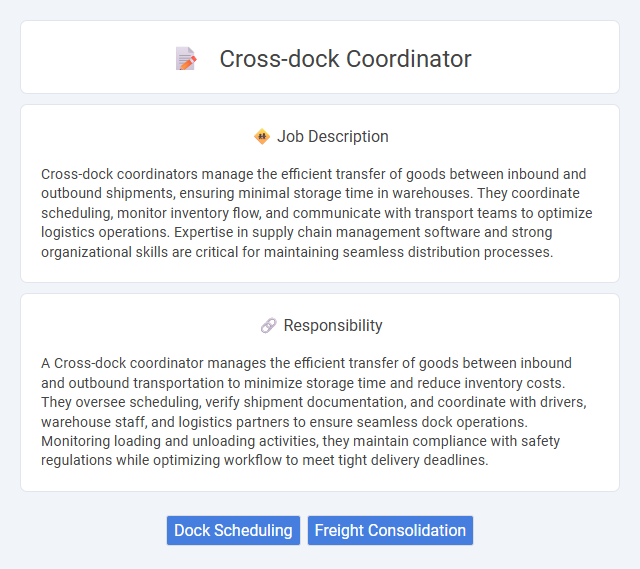
Cross-dock coordinators manage the efficient transfer of goods between inbound and outbound shipments, ensuring minimal storage time in warehouses. They coordinate scheduling, monitor inventory flow, and communicate with transport teams to optimize logistics operations. Expertise in supply chain management software and strong organizational skills are critical for maintaining seamless distribution processes.
Individuals with strong organizational skills and the ability to manage fast-paced environments are likely well-suited for a Cross-dock coordinator role. Those who thrive under pressure, possess excellent communication abilities, and can coordinate multiple tasks simultaneously may find this job aligns with their strengths. Conversely, people who struggle with multitasking or teamwork might encounter challenges in fulfilling the demands of this position.
Qualification
A Cross-dock Coordinator must possess strong organizational skills, experience in logistics or supply chain management, and proficiency in inventory control systems. Key qualifications include excellent communication, the ability to manage multiple shipments simultaneously, and expertise in coordinating with carriers and warehouse staff to ensure timely freight transfer. Familiarity with transportation management software (TMS) and knowledge of safety regulations are essential for optimizing cross-docking operations.
Responsibility
A Cross-dock coordinator manages the efficient transfer of goods between inbound and outbound transportation to minimize storage time and reduce inventory costs. They oversee scheduling, verify shipment documentation, and coordinate with drivers, warehouse staff, and logistics partners to ensure seamless dock operations. Monitoring loading and unloading activities, they maintain compliance with safety regulations while optimizing workflow to meet tight delivery deadlines.
Benefit
A Cross-dock coordinator role likely offers the benefit of enhanced supply chain efficiency by minimizing storage time and expediting product distribution. This position may improve operational workflows, reducing overall transportation costs and boosting customer satisfaction through faster deliveries. Professionals in this role probably gain valuable experience in logistics coordination, contributing to career growth within the supply chain industry.
Challenge
The Cross-dock coordinator role likely presents challenges in managing tight schedules and ensuring seamless coordination between inbound and outbound shipments. There is a strong probability that they must address unexpected delays or inventory discrepancies swiftly to maintain operational flow. Effective problem-solving skills and adaptability are often crucial for overcoming these logistical challenges.
Career Advancement
A Cross-dock coordinator manages the efficient transfer of goods between inbound and outbound shipments, ensuring minimal storage time and streamlined logistics. Career advancement opportunities often include progressing to logistics manager, supply chain analyst, or operations supervisor roles, leveraging expertise in inventory control and distribution processes. Developing skills in data analysis, transportation software, and team leadership enhances prospects for higher-level positions within warehouse management and supply chain operations.
Key Terms
Dock Scheduling
Cross-dock coordinators manage precise dock scheduling to ensure seamless transfer of goods between inbound and outbound shipments, minimizing storage time and optimizing freight flow. They coordinate arrival and departure times for carriers, allocate dock doors efficiently, and monitor loading and unloading processes to prevent bottlenecks. Effective dock scheduling directly improves supply chain velocity and reduces handling costs in distribution centers.
Freight Consolidation
A Cross-dock Coordinator specializing in freight consolidation manages the efficient transfer and grouping of shipments to optimize transportation costs and delivery times. They analyze incoming freight data, coordinate with carriers and warehouses, and ensure timely scheduling to maximize truckload capacity. Proficiency in logistics software and strong organizational skills are essential for maintaining seamless freight consolidation operations.
 kuljobs.com
kuljobs.com